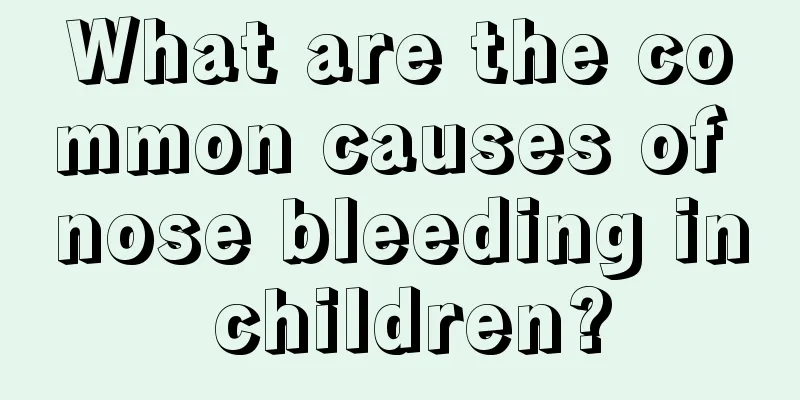What are the common causes of nose bleeding in children?

|
Nasal bleeding occurs in many children, usually from one nostril, and rarely from both nostrils at the same time. When many parents see their children have nosebleeds, they will immediately let their children tilt their heads back to stop the bleeding. In fact, this is a very wrong approach. Once a child has a nosebleed, if the amount is not large, you can just wipe it. If the amount is large, you need to immediately rinse the nose and forehead with clean water, and use a clean cotton ball to block the child's nasal cavity for a while. If the nosebleed continues, it is recommended to go to the hospital for examination and treatment. Most (more than 90%) pediatric nosebleeds are benign and almost always occur in the front part of the nose. If the baby raises his head, the blood will flow to the back of the nasal cavity and the mouth. Some of the blood will enter the stomach and cause discomfort, leading to vomiting, while some may enter the trachea or even the lungs, causing severe coughing. Second, the parents' panic will make the baby more nervous. Most of them are the following four: One reason is seasonal. The climate is dry in summer, which increases the incidence of nosebleeds in children. During this period, it is very common for children to have nosebleeds, so parents should pay more attention to their children's living habits and diet. The second reason is diet. Nowadays, most children are picky eaters and only like to eat meat but not vegetables. Their nutritional intake is not comprehensive, which leads to increased vascular fragility. The third is children's bad behavioral habits, such as rubbing the nose hard, which causes small blood vessels in the nose to rupture. This is also called trauma. Many nosebleeds are caused by external impacts when children are playing, which causes damage to the nasal tissue and causes nosebleeds. The fourth is disease causes, such as blood disease, fever, cough, etc., and at the same time, nasal diseases are one of the important causes of nosebleeds. Rhinitis, sinusitis, nasal concha hypertrophy, nasal polyps, etc. will indirectly cause capillary rupture and form frequent nosebleeds. Precautions In order to prevent nosebleeds, in the dry season, families with children with a history of nosebleeds should prepare some medicines, which can be applied evenly in the nasal cavity every day to moisturize the nasal mucosa. Correct your child's picky eating habits, encourage them to drink more water, eat more vegetables, and arrange their diet reasonably and scientifically. If a child has difficulty breathing through the nose at night, you can moisten the nose with clean water, but never pick the nasal cavity. When a child has a nosebleed, parents should not panic. Let the child sit quietly and fill the nasal cavity with clean cotton wool to stop the bleeding. If there is no cotton wool, you can also use your fingers to press the nose wing towards the facial bone for 5 minutes. Gently release your hand after 5 minutes. If bleeding is still occurring, take your child to the hospital. Apply a cold towel to the nose to constrict the nasal blood vessels. Avoid letting your child blow his nose or do strenuous exercise for half an hour after the bleeding stops to avoid repeated bleeding. If the bleeding still cannot be stopped effectively, or if nosebleeds occur frequently, it is recommended that parents take their children to the hospital for treatment to prevent potential harm. |
<<: How can we quickly relieve toothache in children?
>>: What to do if your 2-year-old baby has diarrhea
Recommend
What medicine should children take for colds?
It is very common for children to catch a cold du...
How to treat synovitis in a two-year-old baby
Many people may not know the cause of synovitis, ...
What should children pay attention to when swimming in summer?
The hot weather in summer makes people just want ...
What should be paid attention to when five-year-old children lose their teeth
Teeth are very important to each of us. Children&...
White spots on the child's body
Mothers all hope that their children are born wel...
Is meningitis serious in children?
What is meningitis? Patients often ask such quest...
What medicine should I take for my baby's cough without phlegm?
Because babies' organs are not yet fully deve...
How to deal with spots on baby's face
If there is an abnormality in the baby's body...
Can a premature baby survive at 25 weeks?
If a pregnant woman gives birth prematurely at 25...
Why does a newborn baby struggle and cry when eating breast milk?
Generally, after a baby is born, it is necessary ...
What are the early symptoms of encephalitis in children?
Encephalitis is a very serious disease. If it occ...
Introducing four quick remedies to relieve children’s toothache
Here are four quick remedies to relieve toothache...
Child has goose bumps due to fever
When adults have a fever, they will feel chills, ...
What are the diagnostic criteria for anemia in newborns?
The physical health of a newborn is what the fami...
How should children's teeth be reshaped?
With the continuous development of society, many ...









